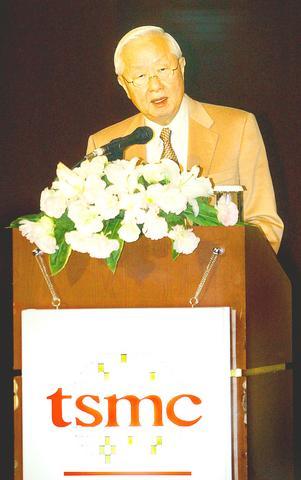Taiwan Semiconductor Manufac-turing Co (TSMC,
"We've done all the preparatory work, and we should be ready to start before the end of the year," TSMC chairman Morris Chang (

PHOTO: AP
He declined to provide more details.
The Ministry of Economic Affairs said last Thursday that the Hsinchu-based chipmaker has met all conditions required for government approval to start production at the US$898 million wafer plant in Shanghai's Songjiang Science Park. TSMC would be the first Taiwanese chipmaker to win approval for a factory in China.
``The China market offers huge potential and being there provides the opportunity for us to compete and work with our rivals in China,'' Chang said after delivering a speech about business cooperation, corporate brand names and economic globalization.
Asked about TSMC's future development and his outlook for the semiconductor sector across the Taiwan Strait, Chang said the company has maintained a roughly 30 percent annual growth rate on average over the past 15 years.
As consumers are buying electronics and firms are unfreezing budgets for equipment after a three-year slump in spending, Chang said he is confident that TSMC would continue prospering at an annual rate of 20 percent on average over the next 10 years.
Market researcher Gartner Inc in February revised upward its prediction for semiconductor sales this year, saying that worldwide chip sales will rise 23 percent to US$216.9 billion this year, the biggest increase since 2000, as demand improves for chips in devices such as DVD players and communications equipment.
The US-based Gartner predicted last November a 20 percent sales gain for this year from US$177 billion last year.
Despite a promising business environment, Chang said he has no intention to restrict the company's business on made-to-order manufacturing alone; instead he wanted to develop TSMC's future business modeling after International Business Machines Corp or Hewllet-Packard Co. He didn't elaborate.
Chang has headed the company since its inception in 1987. Investors have said that finding a replacement for 73-year-old Chang seems to become one of the biggest competitive challenges for TSMC, in addition to the emergence of Shanghai-based Semiconductor Manufacturing International Corp (SMIC,
SMIC has become China's biggest chipmaker in the three years since it was founded. The company and next-door neighbor Grace Semiconductor Manufacturing Corp
(
Chang acknowledged that Chinese semiconductor companies are both a rival and a partner to TSMC.
But if semiconductor industries on both sides can undertake integration well, they may double their competitiveness and thus become an invincible competitor in the world's semiconductor market in 10 years, he added.
TSMC is due to announce its first quarter results at an investors conference on Friday, while its UMC is slated to report its first quarter figures on Wednesday.

When Lika Megreladze was a child, life in her native western Georgian region of Guria revolved around tea. Her mother worked for decades as a scientist at the Soviet Union’s Institute of Tea and Subtropical Crops in the village of Anaseuli, Georgia, perfecting cultivation methods for a Georgian tea industry that supplied the bulk of the vast communist state’s brews. “When I was a child, this was only my mum’s workplace. Only later I realized that it was something big,” she said. Now, the institute lies abandoned. Yellowed papers are strewn around its decaying corridors, and a statue of Soviet founder Vladimir Lenin

UNCERTAINTIES: Exports surged 34.1% and private investment grew 7.03% to outpace expectations in the first half, although US tariffs could stall momentum The Chung-Hua Institution for Economic Research (CIER, 中華經濟研究院) yesterday raised its GDP growth forecast to 3.05 percent this year on a robust first-half performance, but warned that US tariff threats and external uncertainty could stall momentum in the second half of the year. “The first half proved exceptionally strong, allowing room for optimism,” CIER president Lien Hsien-ming (連賢明) said. “But the growth momentum may slow moving forward due to US tariffs.” The tariff threat poses definite downside risks, although the scale of the impact remains unclear given the unpredictability of US President Donald Trump’s policies, Lien said. Despite the headwinds, Taiwan is likely

UNIFYING OPPOSITION: Numerous companies have registered complaints over the potential levies, bringing together rival automakers in voicing their reservations US President Donald Trump is readying plans for industry-specific tariffs to kick in alongside his country-by-country duties in two weeks, ramping up his push to reshape the US’ standing in the global trading system by penalizing purchases from abroad. Administration officials could release details of Trump’s planned 50 percent duty on copper in the days before they are set to take effect on Friday next week, a person familiar with the matter said. That is the same date Trump’s “reciprocal” levies on products from more than 100 nations are slated to begin. Trump on Tuesday said that he is likely to impose tariffs

HELPING HAND: Approving the sale of H20s could give China the edge it needs to capture market share and become the global standard, a US representative said The US President Donald Trump administration’s decision allowing Nvidia Corp to resume shipments of its H20 artificial intelligence (AI) chips to China risks bolstering Beijing’s military capabilities and expanding its capacity to compete with the US, the head of the US House Select Committee on Strategic Competition Between the United States and the Chinese Communist Party said. “The H20, which is a cost-effective and powerful AI inference chip, far surpasses China’s indigenous capability and would therefore provide a substantial increase to China’s AI development,” committee chairman John Moolenaar, a Michigan Republican, said on Friday in a letter to US Secretary of